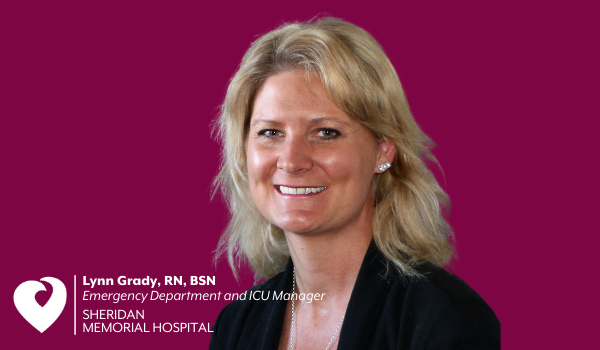By Lynn Grady, RN, BSN – Sheridan Memorial Hospital Emergency Department and Intensive Care Unit Manager who also heads up the hospital’s Stroke Program
Every 40 seconds in the United States, someone experiences a stroke. Stroke is a debilitating and deadly injury to the brain that causes a death every 3.5 minutes in this country. Often the death follows a lengthy illness that limits a person’s participation in the daily activities of life.
Fortunately, there are several things you can do to minimize the risk factors of experiencing a stroke. Managing health conditions such as atrial fibrillation, high blood pressure, high cholesterol, diabetes, and eliminating lifestyle risk factors such as smoking can significantly decrease your risk of experiencing a stroke. Other lifestyle changes one can make to decrease the risk of stroke include maintaining a healthy weight by eating a healthy diet and engaging in regular exercise regimens, minimizing alcohol consumption, reducing personal stress levels, and maintaining regular appointments with one’s healthcare provider. Despite the best efforts of the healthcare industry in providing education and resources, stroke remains the 5th leading cause of death in the US since 2015.
If you do experience signs and symptoms of a stroke, such as sudden numbness in the face, arm, or leg, especially on one side of the body, or sudden confusion, difficulty speaking, or loss of coordination, call 911 immediately or immediately get to the Emergency Department. If someone you know is experiencing these symptoms, a quick and easy way to determine if this person may be experiencing a stroke is the F.A.S.T. mnemonic.
F – Face: Ask the person to smile. Does one side of the face droop?
A – Arms: Ask the person to raise both arms. Does one arm drift downward?
S – Speech: Ask the person to repeat a simple phrase. Is the speech slurred or strange?
T – Time: If you see any of these signs, call 911 right away.
As a stroke can happen in several different areas of the brain, a patient may experience varying degrees of speech and motor symptoms. This is why it is important to immediately seek medical attention if you are experiencing even one of the symptoms above. Acting F.A.S.T is key to minimizing long-term effects that may be experienced due to a stroke. A quick diagnosis is critical to ensure that a patient receives the treatment and medication they need in order to regain as much function as possible.
At Sheridan Memorial Hospital, we are able to offer our community rapid brain imaging and access to a neurologist by using our Tele-Stroke services provided through Wyoming Medical Center. This provides our staff and patients direct access to stroke experts and optimal treatment options that would otherwise not be available in a community in the size of Sheridan. One of the potential treatment options is a medication called TPA, a powerful anticoagulant (blood thinner) that can be used to help dissolve the clot that is causing the stroke. We are able to provide this particular treatment in Sheridan so that our patients can stay home in their community alongside their families while receiving care. TPA, however, must be administered within 4 hours of the initial onset of symptoms — another reason why time is of the essence if you think you may be experiencing a stroke.
After the initial treatment of the stroke, our patients can then go on to receive physical and occupational therapy services offered by Sheridan Memorial Hospital’s Wyoming Rehab to ensure that they can regain as much strength and function as possible prior to being discharged. If TPA is not an option for the particular type of stroke a patient is experiencing, a treatment plan can be quickly determined between our physicians at Sheridan Memorial Hospital and the neurologists through Wyoming Medical Center.
If you have any questions regarding your potential stroke risk factors, you are highly encouraged to schedule an appointment with your primary care provider to address these concerns. If you don’t have one, check out Sheridan Memorial Hospital’s Internal Medicine practice or call: 307.675.2650

